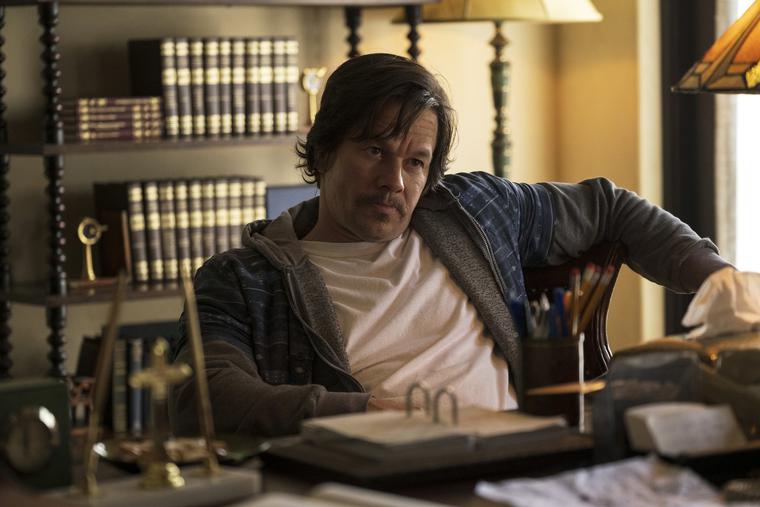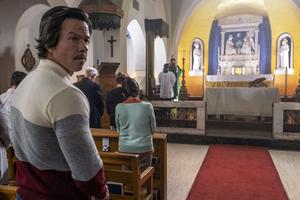‘Thy Grace Into Our Hearts’: ‘Father Stu’ and the Path of Conversion
MOVIE REVIEW: The film’s serious tone toward matters of faith and theology adds to the true story of finding one’s purpose.

“My grace is sufficient for you, for power is made perfect in weakness” (2 Corinthians 12:9). This line from St. Paul is reflected in the remarkable true story of the late Father Stuart Long, brought to life on screen in the new biopic Father Stu. While immersed in the religious milieu that ultimately defines Stuart Long’s life, Father Stu does not content itself with simply following a sappy formula that constitutes so much “faith-based” fare; the film is not interested in imparting a message, instead offering a high-quality cinematic experience about complex, all-too-human characters who have to dig deep within themselves to finally ask the question: “What does God want from me?”
First-time writer-director Rosalind Ross helms the film. Her skill as a screenwriter is complemented by a strong cast, anchored by lead Mark Wahlberg. Wahlberg portrays Father Stu in an earnest, soul-baring performance. He appears in nearly every scene, clearly relishing the part of the unfiltered title character. It is one of Wahlberg’s most realized acting achievements; the zeal and tenacity that propels Stu toward the priesthood echoes the “never give up” spirit of another real-life figure played by Wahlberg, Navy SEAL Marcus Luttrell in Peter Berg’s Lone Survivor (2013).
Indeed, it is Wahlberg himself who toiled to adapt Father Stu’s story to the screen for six years. He finally financed the film himself after it was rejected by mainstream studios. In this way, Wahlberg followed in the footsteps of his onscreen father, Mel Gibson, whose 2004’s The Passion of the Christ remains a touchstone for Catholic moviegoers. In Father Stu, Gibson takes his cue from Wahlberg: As Bill, he is ultimately a vulnerable, fragile figure in need of God’s love. In the movie portrayal, the alcoholic, aging father has long since blanketed his love for his son by rejecting God, cursing others, and running out on his family. Bill’s own moral conversion is a delight to see: “There will be rejoicing among the angels of God over one sinner who repents” (Luke 15:10).
Ross and the film’s cinematographer, longtime Wahlberg collaborator Jacques Jouffret, frame scenes tightly, as if unsettledness and agitation hover over Stu as he tries to find his place. Despite being estranged from his father, constantly disappointing his mother (Jacki Weaver), and haunted by the death from years earlier of his young brother, Stu is a happy-go-lucky young man when we first meet him. He enjoys life as a small-time boxer in Montana before injuries derail that dream. Ever the optimist, he decides to become an actor in Hollywood, taking a day job in the meat market of a grocery store. This is one of the funniest parts of the film, as we see Stu, all smiles, set out to make a name for himself with no contacts and no experience but a wealth of hope.
It is in the supermarket, behind the meat counter, when he first sees Carmen (Teresa Ruiz). Carmen is absolutely committed to her Catholic faith. The non-Catholic Stu is absolutely committed to pursuing Carmen, even if it means following her to Mass — eventually, even to the baptismal font. Carmen’s faith is at first an obstacle to Stu. But, gradually, metanoia begins to shape his perspective. And when a horrific motorcycle accident nearly kills him, Stu’s conversion is clear, his vocation in sight. His answer to what God wants from him is now simple, even urgent: the priesthood.
The amount of pushback Stu receives when expressing his vocation to those around him is a prescient observation. How many young men have been dissuaded by taking that path out of fear of what others might think? Continuous prayer for priests and an increase in vocations, then, is paramount. Along these lines, Father Stu is refreshingly frank in talking about the Gospels, about contrition and forgiveness, about the meaning of suffering. It reverently depicts the consecration of the Precious Body and Blood of Christ. While some viewers may take issue with the inclusion of foul language, such crude dialogue is a reflection of the rawness that is Stu and the world by which he was shaped.
Therefore, is the film appropriate for Catholics? What should be embraced is the film’s serious tone toward matters of faith and theology, including references to St. Augustine, in its authentic portrayal of Catholic life, and simply in depicting the spiritual transformation of Stu. Adult Catholics, whether practicing or lapsed, would find value in Father Stu and might even compel someone who has been away to consider what a life with God might look like. “Just say Yes to Him? You never know what he’d do with you!” Peter Kreeft said once. Once Stu took that leap in saying “Yes,” there was no looking back.
Two final points to emphasize the film’s impressive grasp — and unabashed willingness — to integrate Catholic spirituality: The first is the theme of grace woven through the film. Once Stu comes to understand the graces given him by God to be his vessel for good, the scales began to fall from his eyes (Acts 9:18). We see tangible examples of sacramental grace, sanctifying grace, and a very significant moment of actual grace in the film. One might argue that Father Stu is a series of scenes punctuated by moments of grace. Here, we have echoes of Robert Bresson’s film adaptation of Georges Bernanos’ novel The Diary of a Country Priest (1951) and the novel — and film’s — closing line: “All is grace!”
The second point is that I submit Father Stu is a Marian film. And just like in The Passion, in Father Stu, Mary appears at a major, critical moment. Time and again thereafter, Stu turns to the Blessed Mother for refuge. In a wonderful payoff, an ailing Stu drags himself along the church’s floor toward a statue of Mary, visually evoking what Carmen’s father explained to Stu earlier in the film, about how pilgrims in his homeland crawl toward a statue of the Virgin to express their devotion. When Stu passes a St. Joseph medal to a penitent through the confessional screen, the invocation of the entire Holy Family is complete.
The world would be deprived of knowing the story of Father Stuart Long if not for Mark Wahlberg’s perseverance in committing the story to screen. As both an actor and producer, it was a labor of love, and he put his heart into it. Wahlberg undoubtedly saw something of himself in Stu, and by portraying him with the gusto the role deserved, he carries on Stu’s zeal of bringing Christ to others. Stu changed the people around him, even his long-hardened-hearted father. Now, Father Stu might prompt us to change, too.
VIEWER CAVEAT
The movie is rated R, for language throughout, so viewer discretion is
advised.
- Keywords:
- Father Stu
- mark wahlberg
- catholic movies

















